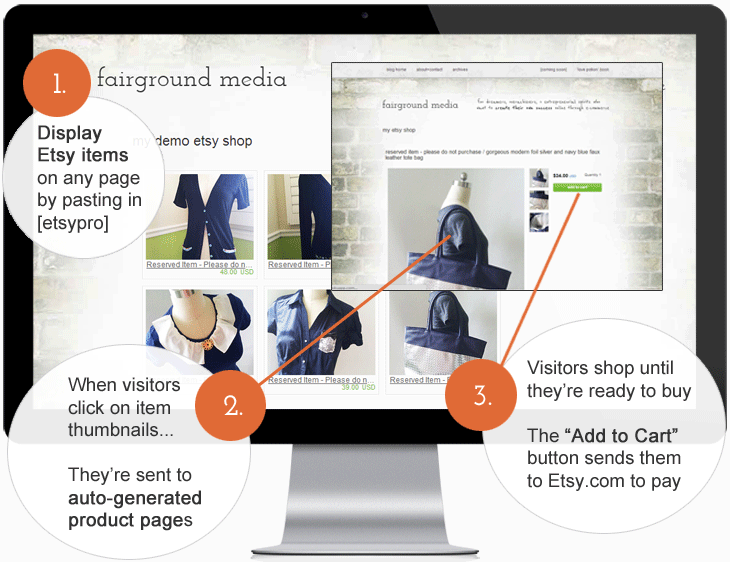Small Business
Secrets of the Etsy Elite; What Separates the Professionals From the Amateurs?
Marketplace websites are awesome, right?
I’m talking about sites like Etsy, Artfire, Bonanza, Zazzle, Meylah, Society 6, BRIKA… where there’s a huge gathering of buyers and sellers, in one place. It seems like new ones are popping up all the time.
From the sellers’ perspective, sites like Etsy can be a great place to start– and test– a business with minimal commitment. See if your business concept is one that attracts people. Try out different pricing. Gather information about what does or doesn’t sell.
Further, sites like Etsy can be incredible marketing channels. Driving traffic is a major hardship for most new businesses, but Etsy already gets tons of it.
That’s not to say you get the benefit of Etsy’s traffic without any work at all. You need to be selling something that stands out in the crowd, you need to know how to use keywords, and be able to jump on seasonal trends– since catering to the time of year or pop culture trends will help snag e-mail and front page features.
At least all of the conventional advice says that if you manage to do the above you’ll see success through the site….
Marketplace websites are awesome, right?
I’m talking about sites like Etsy, Artfire, Bonanza, Zazzle, Meylah, Society 6, BRIKA… where there’s a huge gathering of buyers and sellers, in one place. It seems like new ones are popping up all the time.
From the sellers’ perspective, sites like Etsy can be a great place to start– and test– a business with minimal commitment. See if your business concept is one that attracts people. Try out different pricing. Gather information about what does or doesn’t sell.
Further, sites like Etsy can be incredible marketing channels. Driving traffic is a major hardship for most new businesses, but Etsy already gets tons of it.
That’s not to say you get the benefit of Etsy’s traffic without any work at all. You need to be selling something that stands out in the crowd, you need to know how to use keywords, and be able to jump on seasonal trends– since catering to the time of year or pop culture trends will help snag e-mail and front page features.
At least all of the conventional advice says that if you manage to do the above you’ll see success through the site.
secrets of the etsy superstars
Anyway, not all too long ago, I did some research of my own on the featured sellers from the Etsy blog’s “Quit Your Day Job” posts. I was just curious to see for myself exactly how well these individuals were doing and if there were any unusual or seldom talked-about patterns leading to their success.
One by one, I started checking them out, asking lots of questions like: How much $$$ is their average sale? How many sales did they make in the last year? How much money does that add up to? (And what kind of profit might be left after basic costs?) What is this seller doing that most others are not?
Sure, this wasn’t anything close to an exact science. But after putting some time into it, I felt confident enough to draw a few conclusions about these Etsy superstars and their respective shops:
- 1. Though the amount of money was usually significant, many of these Etsy sellers (who are described as having quit their day job) were not making anything close to a living wage from their Etsy sales alone.
- 2. Every featured seller had some form of social media presence helping to drive sales.
- 3. Every successful seller profiled owned their own website in addition to their Etsy storefront.
So… in a nutshell, the biggest secret of Etsy’s elite seemed to be that they went beyond the Etsy “walls.” They knew they’d have the best chance at success pursuing multiple avenues for income and exposure, even if Etsy was their main focus.
the non-negotiable, controlled-by-you website
To be specific, I think the most important takeaway from this is that every serious Etsy seller should have their own website.
Turns out, whether it’s made of up of just a few static pages, a blog, or a full-featured e-commerce store of its own, having your own website in addition to your Etsy shop is key to escaping amateur-ville and becoming a real player.
There are many huge reasons for this beyond the now-obvious “All the cool kids are doing it!” And most of them have to do with simply taking your business seriously enough to think about its future:
- 1. Fact is, many entirely well-intentioned sellers have had their Etsy shops shut down, without warning or explanation. Having your own website is insurance that your best customers will be able to find you again, even in the chance that your Etsy shop goes MIA.
- 2. Having your own website allows you to build up your SEO (search engine optimization) cred now, so that it will pay off later if/when you decide to move your store away from Etsy or expand into your own e-commerce store. Printing your “your-company-name.com” web address onto all of your marketing materials and generally training potential customers to find you there first is key to this.
- 3. Journalists and their publications take businesses more seriously when they have their own site. Therefore, you’re open to more opportunities for exposure. Not to mention, with your own website at your command, you can carefully craft a “Media” or “Press” page full of all the juicy deets about you, your product, as well as some gorgeous high-res images, to make your business all the more press-ready.
- 4. See a shop with a fiercely loyal following, and I’ll show you an e-mail list. Unfortunately, Etsy doesn’t accommodate the sort of opt-in box you need to collect e-mail addresses from customers in a straight-forward, legal way, so you can’t easily continue contact with them in the future and win their repeat business. Having your own website means you can use opt-in forms wherever and whenever you like.
- 5. Finally, by having your own site, you’re showing contacts you meet in-person and on social media that you are your own brand– not just a minuscule drop in the bucket of Etsy. And from a psychological perspective, that means they’re more likely to remember you and view your goods as high-value.
So, if you’re serious about the future of your Etsy business, I hope you’ll follow the pros’ lead and get yourself hooked up with your own “your-company-name.com” website. Even if it’s just something simple for the time being.
And if you’ve got any further thoughts or advice on the matter, I hope you’ll share! Maybe you’re surprised that all of these featured sellers had a website of their own? Not surprised? Are you considering setting up a website, or have you run into obstacles that have stopped you in your tracks? Your experience is so valuable to others. Leave it for us below!
P.S. I recently set out to create a plugin that would quickly turn an Etsy seller’s WordPress.org blog into something they are tremendously proud of.
Welp– that plugin is now LIVE! Which means there’s no longer any excuse for an Etsy seller not to have an amazing site of their own.
To learn more, read user testimonials, and see a live demo, click the graphic below!














